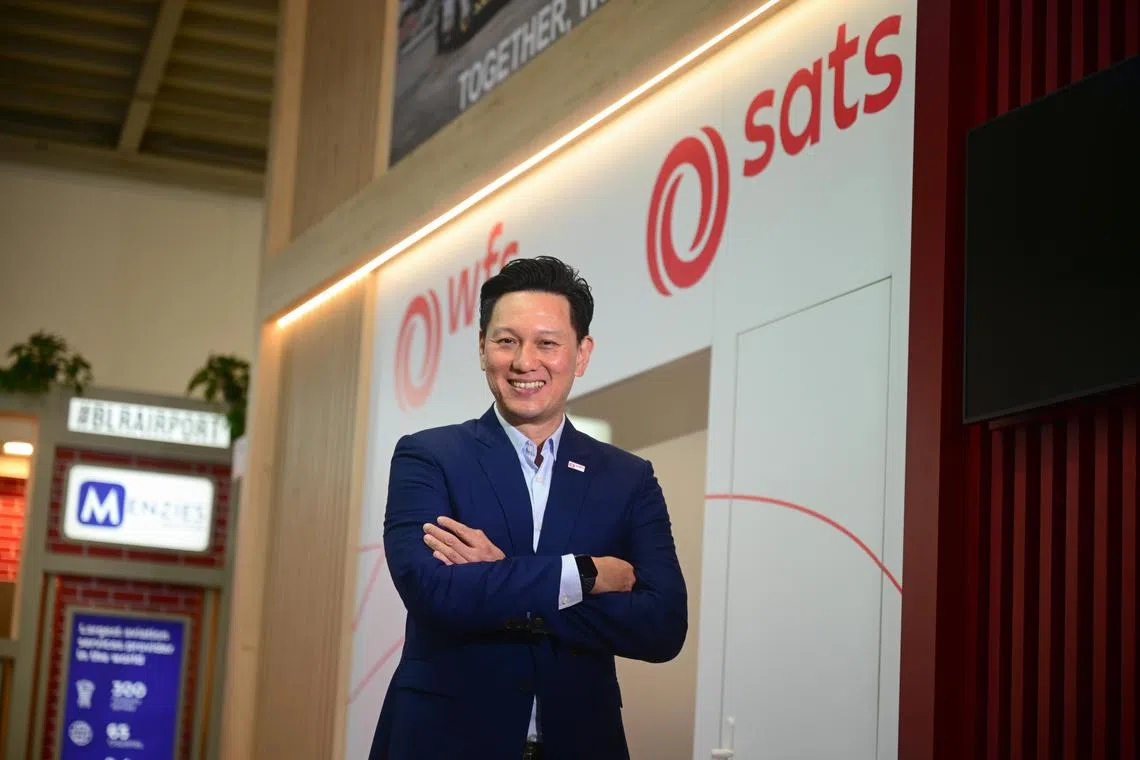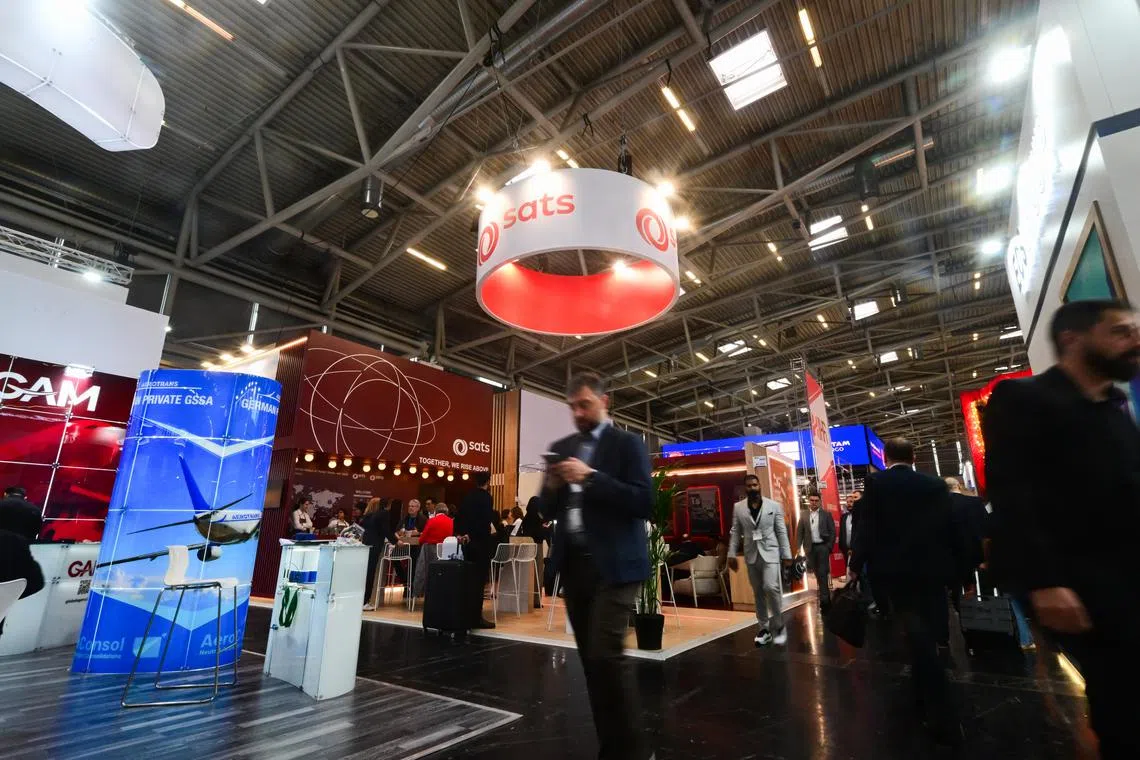Sats ‘confident’ in navigating tariff situation, says chief executive Kerry Mok
Sign up now: Get ST's newsletters delivered to your inbox

Mr Kerry Mok, president and CEO of Sats, spoke to The Straits Times on the sidelines of the Air Cargo Europe trade show in Munich, Germany.
ST PHOTO: AZMI ATHNI
MUNICH – Sats, the Singapore-listed air cargo handling services provider, is confident about facing any disruptions from the global trade war being waged by the US, Mr Kerry Mok, the company’s president and chief executive, said on June 3.
Speaking to The Straits Times on the sidelines of the Air Cargo Europe trade show, Mr Mok said he views the tariff situation
Air Cargo Europe is being held in Munich until June 5.
Sats is the world’s largest air cargo handler, following its acquisition of Paris-based global air cargo logistics provider Worldwide Flight Services (WFS) in 2023 at a cost of €1.3 billion (S$1.8 billion).
Following the acquisition of WFS, the combined Sats and WFS network operates over 215 stations in 27 countries. These cover trade routes responsible for more than 50 per cent of global air cargo volume.
Mr Mok said his confidence stems from “the playbook that we have developed through Covid, (which) has served us well”.
So far, air cargo volumes have not been affected by hefty tariff increases, possibly because of front-loading by businesses to get their goods off the ground during the 90-day reprieve, he said.
On May 12, China and the US agreed to lower reciprocal tariffs to 10 per cent for 90 days as they committed to trade talks. While it is uncertain what will happen after the 90 days, Mr Mok said he expects that Sats, as a global company, will be able to weather the storm.
A part of the business that is not doing well could be propped up by other parts of the business that are unaffected, he said. “In a networked environment, if US volumes drop, Europe’s volume increases, Asia volumes may increase.”
Because Sats has a global network, it may in fact benefit from a rise in volumes elsewhere, he added.
Total demand for air cargo rose by 5.8 per cent in April 2025, compared with April 2024 levels, according to data released by the International Air Transport Association. Its director-general also said the outlook for air cargo is encouraging, though “stresses in world trade are no secret”.
One of the lessons to come out of the Covid-19 pandemic is that air cargo was “a shining spot” for many airlines and companies, said Mr Mok. When Sats was looking to expand, “we identified cargo as a segment for expansion, because cargo is global... and our customers operate in a global environment”.
Sats offers airport services like airfreight handling, passenger services and ground handling.
It is also a major airline caterer and provider of food solutions to other institutions.
“We can’t just stay big in Singapore and then be happy with that,” Mr Mok said.
He said the WFS acquisition made sense because “we are the leader in the Asia-Pacific, and they are market leaders in the US, the Americas and in EMEA (Europe, Middle East and Africa), and we have very little overlap”.

Sats’ booth at the Air Cargo Europe trade show in Munich, Germany, on June 3.
ST PHOTO: AZMI ATHNI
Nonetheless, Mr Mok said, the acquisition was not without its naysayers. “People said there’s no chance... that Singapore companies always fail when they go overseas.”
But Sats took a long-term view, rather than focus on short-term profits and liabilities. “That’s not how we run the business,” he said.
“I think people are now starting to understand that it’s working financially. We’re now back on track.”
In May, Sats reported a net profit of $38.7 million
Revenue for the fourth quarter was $1.5 billion, up 10.4 per cent year on year from $1.3 billion.
This was driven by continued business volume growth and rate improvements, said Sats in a media release in May.
On a full-year basis, the group reported profit of $243.8 million, soaring more than four times from $56.4 million a year ago. Revenue came in at $5.8 billion, gaining 13 per cent from $5.1 billion a year ago.
Terminal 5
Turning to Terminal 5, Mr Mok said Sats will “play a big part in the design of T5”, particularly in the area of technology.
In May, Sats announced that it would be investing over $250 million the opening of T5
An expansion project more than a decade in the making, T5 will position Changi Airport to ride a predicted surge in air travel within the Asia-Pacific and beyond.
Designed to handle about 50 million passengers a year, T5 will effectively double the size of Changi Airport and boost its current capacity of 90 million by more than 55 per cent.
The Changi East development, where T5 is located, will also house the Changi East Industrial Zone, which will almost double the airport’s annual cargo-handling capacity from three million tonnes to 5.4 million tonnes.
Mr Mok said the investment would refresh Sats’ operations and bring in new equipment, with the goal of driving up productivity.
“We’ve got to find new technologies, new ways that will allow us to be efficient in driving the growth of T5,” he said.
The solutions will not be those that exist today, he promised, noting that Sats can tap the global network and the trials it has going on around the world.
For example, a WFS cargo facility in Barcelona is testing automatic guided vehicles as part of an initiative to incorporate automation and improve efficiency, safety and productivity.
“It’s important that T5 succeeds, and we want to play a big role in making that work for Changi,” Mr Mok said.
Vanessa Paige Chelvan is a correspondent at The Straits Times. She writes about all things transport and pens the occasional commentary.



